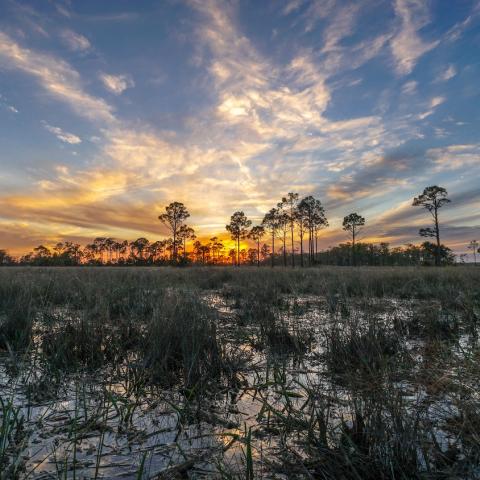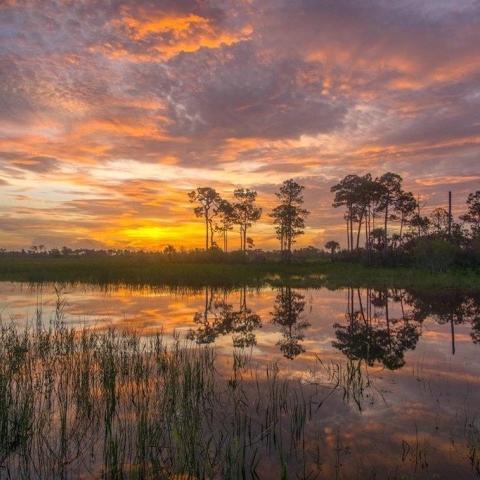
More than a half-dozen National Park System units were closing ahead of Hurricane Milton, pictured here Tuesday morning/NOAA
Editor's note: This story is updated with additional information about measures taken in Cumberland Island National Seashore in Georgia and Canaveral National Seashore in Florida.
Biscayne and Dry Tortugas national parks were among the latest units of the National Park System that closed to brace for Hurricane Milton, a historically large storm that forecasters say could become "one of the most damaging" hurricanes ever to hit Florida.
Biscayne closed its Convoy Point, Elliott, Adams, and Boca Chita Key facilities Tuesday, while Dry Tortugas closed Garden and Loggerhead Keys, including the campground, main docks, and visitor courtesy slips.
"Marine waters and designated safe harbors remain open for boating; no emergency services," a Dry Tortugas dispatch read. "Concession-operated ferry and sea plane tours are suspended."
Joining those two parks in closing Tuesday were Canaveral National Seashore, also in Florida, and Cumberland Island National Seashore in Georgia. Fort Pulaski National Monument in Georiga was going to wait until Wednesday morning to close.
At Cumberland Island, all visitors, staff and volunteers have been evacuated. Before they left, staff sandbagged buildings and pulled boats from the water and moved them along with other vehicles to safer conditions inland. Valuable equipment was moved to higher ground, including second stories of structures.
Staff at Canaveral moved all ATVs and UTVs to secure garages, and tried to move as many canoes and kayaks as possible to safe locations, tying up others as best they could. They also turned over picnic tables and moved them from areas where they could blow into buildings.
Big Cypress National Preserve closed Monday morning, while De Soto National Memorial, located at Bradenton, Florida, near the point that Milton is expected to ram ashore, has been closed since Hurricane Helene hit in late September.
Timucuan Ecological and Historic Preserve closed at noon Monday. Castillo de San Marcos and Fort Matanzas national monuments on Florida's east coast also have been closed since Hurricane Helene hit in late September.
Everglades National Park was open Tuesday, but services were limited and visitor centers closed.
The hurricane, which slowed its eastward progression a bit overnight, was now expected to hit Tampa head-on late Wednesday.
“AccuWeather hurricane experts are increasingly concerned that Milton can become a 'worst-case" hurricane impact for the Tampa Bay area,” warned AccuWeather Chief Meteorologist Jon Porter. “You do not want to wait for storm surge to start occurring before you take action. We have seen so many preventable tragedies during Hurricane Helene and Hurricane Ian. Please get out of areas at risk of this devastating storm surge while you still can. Hurricane Milton could push up to 23 feet of storm surge into the hardest hit areas. We are very concerned that Hurricane Milton could become one of the most damaging and costliest storms that Florida has ever seen.
"Slight variations in Milton’s track can have major ramifications for the impacts experienced in various parts of Florida. For example, in a scenario which now appears more probable, should an intense Milton track just north of Tampa, storm surges of 23 feet could occur in parts of Tampa Bay, resulting in widespread, catastrophic damage not seen in this part of Tampa Bay in modern history,” Porter warned in a release.

By mid-day Tuesday the storm's winds were clocked around 155 mph, with higher gusts.
"Milton is a category 4 hurricane on the Saffir-Simpson Hurricane Wind Scale," the National Hurricane Center said. "While fluctuations in intensity are expected, Milton is forecast to remain an extremely dangerous hurricane through landfall in Florida."
The center added that, "Milton's wind field is expected to expand as it approaches Florida. In fact, the official forecast shows the hurricane and tropical-storm-force winds roughly doubling in size by the time it makes landfall. Therefore, damaging winds, life-threatening storm surge, and heavy rainfall will extend well outside the forecast cone. It is worth emphasizing that this is a very serious situation and residents in Florida should closely follow orders from their local emergency management officials. Evacuations and other preparations should be completed today. Milton has the potential to be one of the most destructive hurricanes on record for west-central Florida."




 Support Essential Coverage of Essential Places
Support Essential Coverage of Essential Places







Comments
I'm from the Tampa Bay area and the Bradention/Manatee area, in which DeSoto National Memorial is located, is about to get creamed again by Hurricane Milton. I wonder if the NPS (and the Congress) will authorize the funds to repair the Memorial (if there is anything left) given the controversial nature of DeSoto's expeditionj?